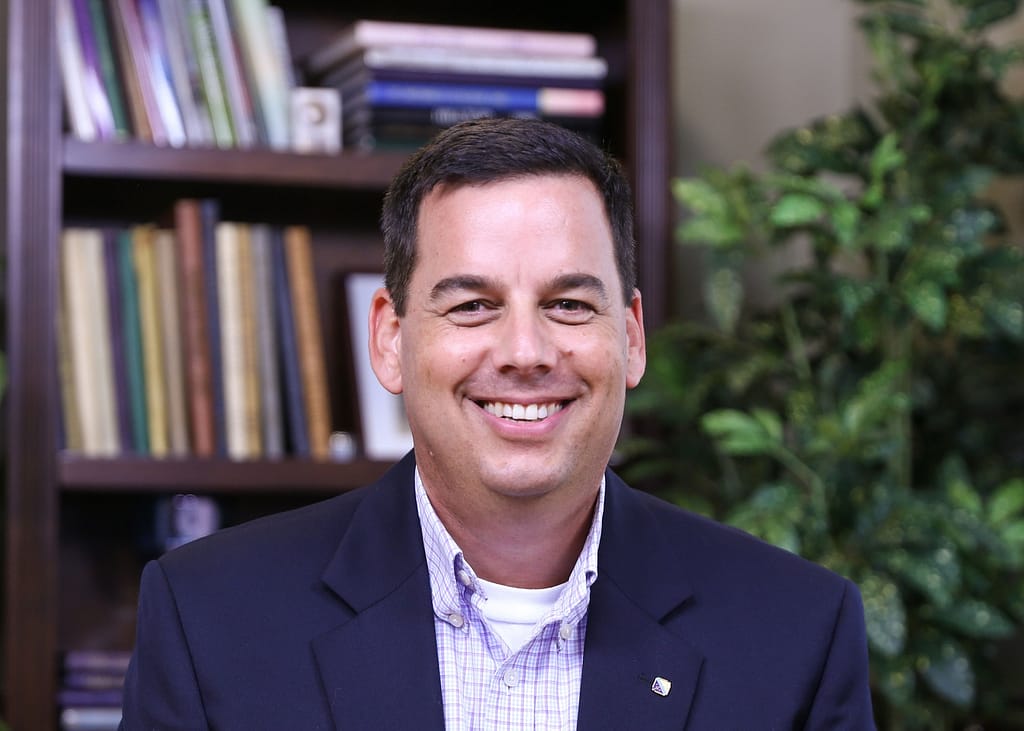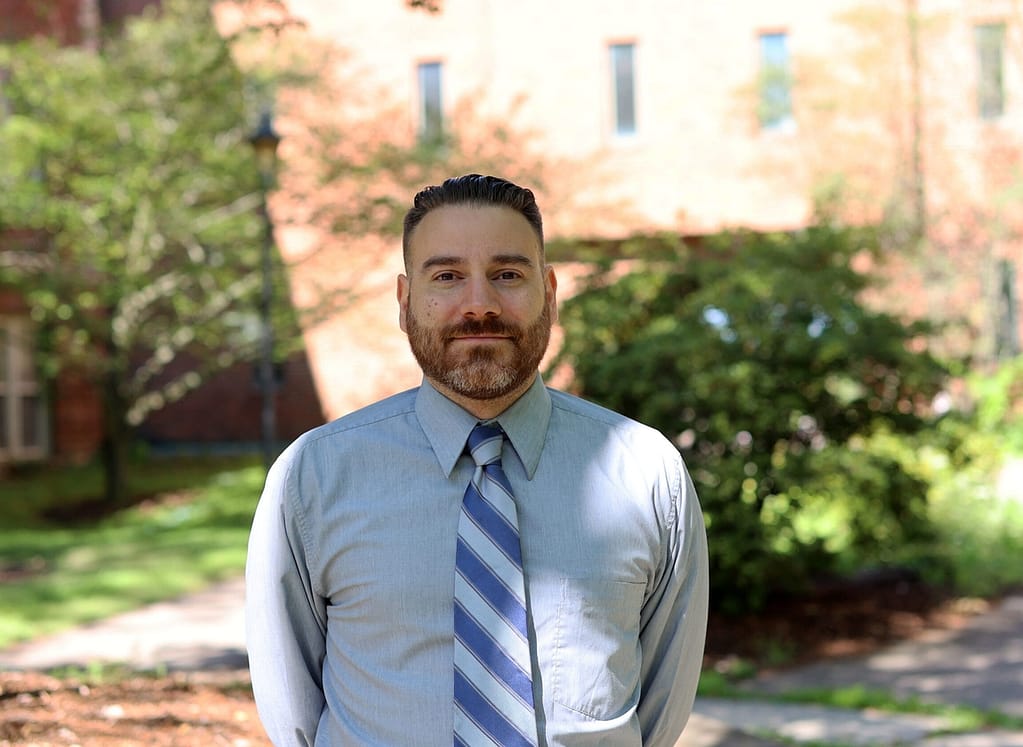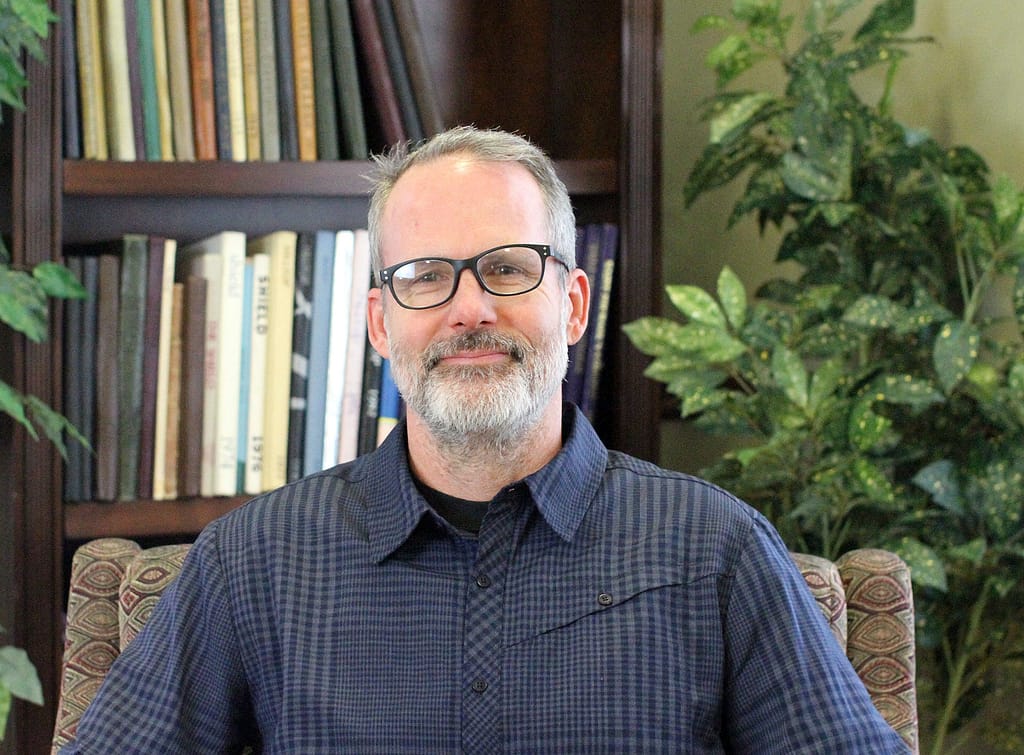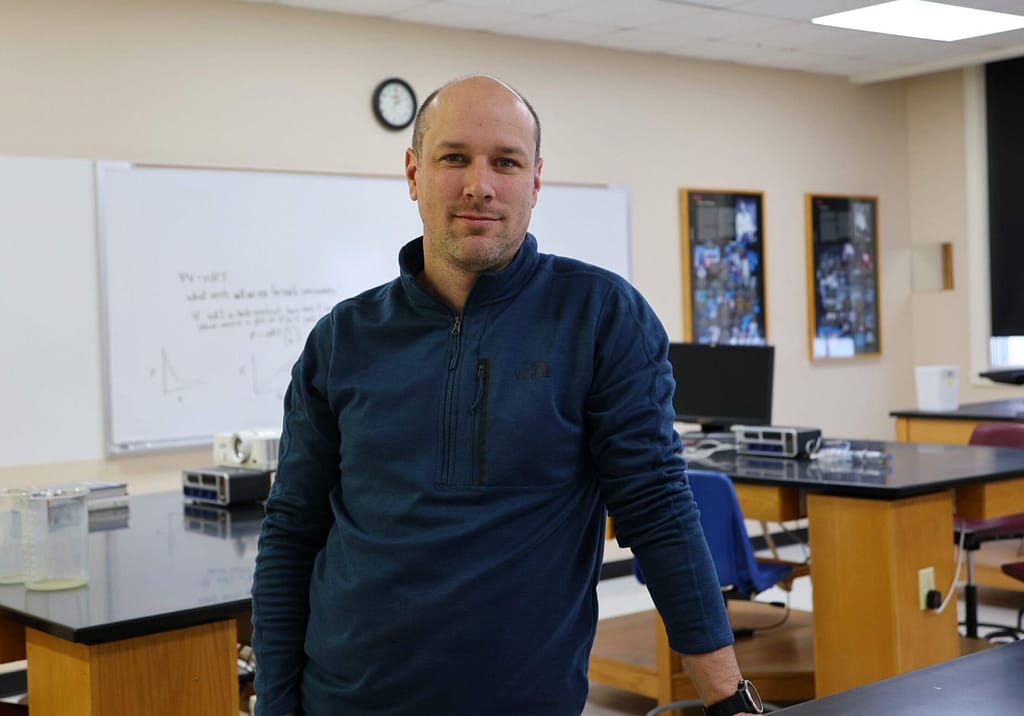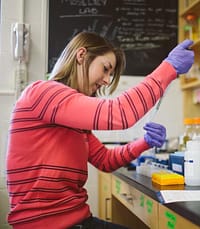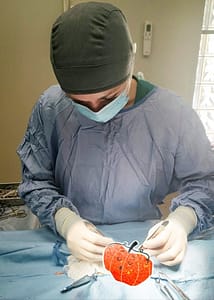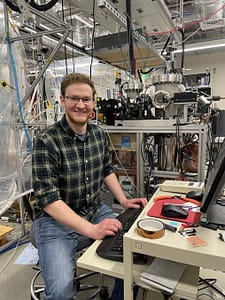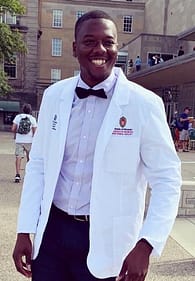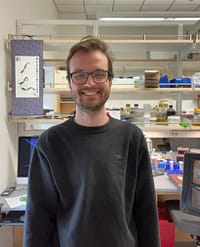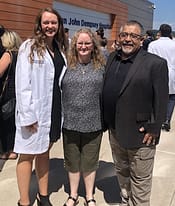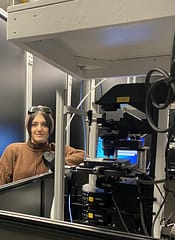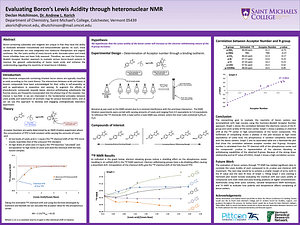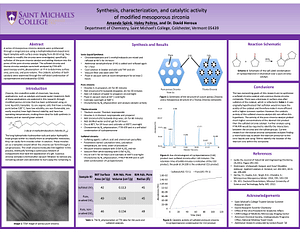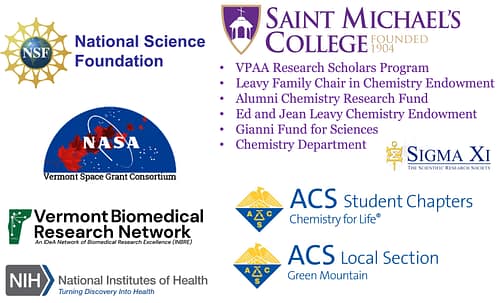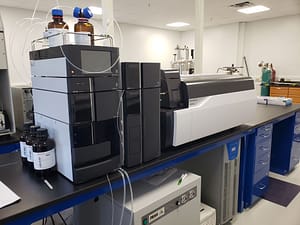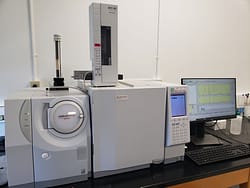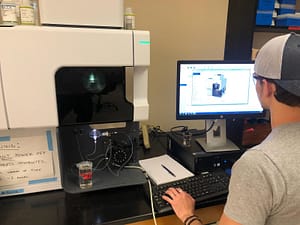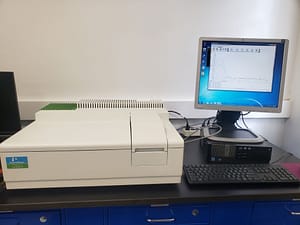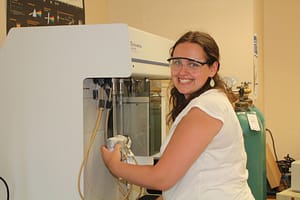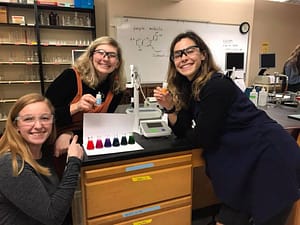About
The chemistry curriculum at Saint Michael’s College combines small class sizes, excellent faculty and personal attention with the opportunity to gain practical, hands-on experience with laboratory instrumentation early in your college career.
Our program is approved by the American Chemical Society – a designation that is important to both graduate schools and employers.
A bachelor’s degree in chemistry prepares you for employment in government and industrial laboratories or for further study in graduate or professional schools. By choosing appropriate electives, a major in chemistry can lead to a career in medicine, dentistry, allied health sciences, law or the business world.
Our chemistry program has an excellent track record for acceptance to graduate and professional schools. Recently, our alumni have gone on to graduate programs at such schools as Dartmouth, Duke, Tufts, and Yale.
Learn more about the Chemistry program from our Saint Michael’s professors in the video below:
In Depth
Our program focuses on preparing you to succeed in industry and academia by helping you develop the skills to solve chemical problems, to read meaningfully and to utilize properly chemical literature, to work effectively and safely in the laboratory, to communicate scientific ideas and discoveries both orally and in writing, to function well as a member of a team, and to make ethical decisions in the area of science.
Chemistry is the study of matter and its changes. As a chemistry major, you will start with the science and math courses that provide the background necessary to study chemistry. Those courses include General Chemistry I &II, Organic Chemistry I &II, Calculus I &II, College Physics I &II, and Integrated Chemical Analysis. In these introductory chemistry courses, you will gain a broad overview of the many different topics in chemistry, including stoichiometry, bonding, gases, the structure of atoms and molecules, acid-base theory, organic synthesis, error analysis, ethical issues in science, and quantitative analysis. Then you will go on to study further in the areas of inorganic chemistry, physical chemistry, biochemistry and chemical instrumentation, where you will learn about thermodynamics, kinetics, quantum chemistry and spectroscopy, the structure and formation of coordination compounds, group theory, some of the major categories of structures that make up biological systems (including peptides/proteins, carbohydrates and nucleic acids), and the chemical instrumentation that can be used to study the structure and function of molecules.
As a senior, you will research a chemistry topic in great depth as part of your capstone course, Senior Seminar. You will have two options: you may either prepare a major report on the topic or develop a related research proposal (modeled after the process whereby scientists procure funding for research). For examples of recent chemistry senior projects, go to Seminar Projects. You will also be strongly encouraged to conduct academic research or complete an internship as part of your education.
Careers
Saint Michael’s alumni are involved in careers powered by purpose.
Graduates from our chemistry program have forged remarkable paths in diverse fields, exemplifying the versatility and depth of their experience in the Saint Michael’s College Chemistry program.
Katherine (Katie) Schutt, BS & PhD
Scientist in Engineered Cells, Synthego
SMC major: Chemistry
SMC minors: Biology & Mathematics
College highlights: lab preparatory worker & teaching assistant for Chemistry; conducted research with Chemistry Professor Shane Lamos; a Goldwater Scholar* (the premier under-graduate award in math, science & engineering); recognized as the outstanding senior in Chemistry, awarded at graduation; co-valedictorian for her graduating class
PhD: Dartmouth College, in Cell Biology and Biochemistry
Current position: Katie is working as a Scientist in Engineered Cells at Synthego in the Bay Area of California. They generate custom CRISPR-engineered cell lines for research purposes.
Jasmine Magloire, BS & EMT
Emergency Medical Technician
SMC major: Chemistry
SMC minor: Gender Studies
College highlights: lab preparatory worker & lab teaching assistant in Chemistry; did an independent study project with Chemistry Professor Schroll, involved development of a new lab project for organic chemistry; obtained EMT certification through Essex VT Fire & Rescue
Current position: Jasmine is working as a full-time EMT with the 911 service in her hometown. Her long-term goal is to train to be a flight paramedic or flight nurse.
Katie (Summo) Kavouris, BS & PhD
Associate Director of Process Chemistry at Syros Pharmaceuticals
SMC major: Chemistry
SMC minor: Mathematics
College highlights: lab preparatory worker in Chemistry; conducted 2 summers of research with Chemistry Professor Shane Lamos
PhD: Boston University Department of Chemistry
Current position: Katie is an Associate Director of Process Chemistry at Syros Pharmaceuticals, Cambridge MA. She
leads all chemistry activities for the development of active compounds in potential drugs, from finding and optimizing
the best synthetic route through to multi kilogram-scale manufacturing.
Emily Schuchman, BS & DVM
Veterinarian
SMC major: Biochemistry
College highlights: During semesters and summers, Emily did a great deal of volunteering, shadowing, and working at veterinary clinics. While completing her senior year at SMC, she worked full-time for a local vet clinic.
Advanced education: Saint George’s University School of Veterinary Medicine
Current position: Emily is an associate veterinarian at a private general practice as well as a part-time associate for a mobile
euthanasia service, Lap of Love. Her days are incredibly busy, ranging from healthy puppy/kitten visits, sick pet appointments, a wide variety of surgeries, and euthanasia.
David Weiss, BS & RN
RN III and Charge Nurse
SMC major: Biochemistry
SMC minor: Medieval Studies
College highlights: lab preparatory worker & teaching assistant in Chemistry; also volunteered for SMC Fire & Rescue*; conducted research with Chemistry Professor Christina Chant
Advanced degree: completed a Bachelor of Science in Nursing program at ECPI University in Florida
Current position: David is a RN III and charge nurse at the University of Vermont Medical Center’s Emergency Department. He is also a disaster medicine specialist with the Vermont State Urban Search and Rescue task force.
Graduate Study
See the exciting work our alumni our doing in graduate programs.
Our chemistry program has an excellent track record for acceptance to graduate and professional schools. Forty-two percent of our chemistry and biochemistry graduates immediately attend graduate science or medical schools.
Austin Flueckiger, BS, PhD candidate
SMC major: Chemistry
SMC minors: Biology & Environmental Studies
College highlights: lab preparatory worker, teaching assistant & tutor for chemistry; conducted research with Chemistry Professor Christina Chant
Current position: Austin is a 4th year graduate student completing his PhD in Chemistry at the University of Vermont. His research is focused on the impact of relative humidity on the physical and chemical properties of organic aerosols. By monitoring their properties, it is possible to see how water plays a role in their formation which can help us understand how aerosols impact our environment.
Mohamed Fofana, BS, medical student
SMC major: Biochemistry
SMC minor: Psychology
College highlights: lab preparatory worker & lab teaching assistant in Chemistry; conducted research with Biology Professor Declan McCabe.
Advanced education: Mohamed completed a post-baccalaureate program at Rutgers University, to better prepare him to apply to medical school.
Current position: Mohamed is a medical student at the University of Wisconsin. He will likely specialize in Emergency Medicine.
Noah Robinson, BS, PhD candidate
SMC majors: Biochemistry & Philosophy
College highlights: lab preparatory worker & tutor in Chemistry; conducted research with Biology Professor Mark Lubkowitz; recognized as outstanding senior in both Biochemistry & Philosophy, awarded at graduation
Current position: Noah is a Bioengineering PhD student at Caltech in Pasadena CA. He is working on a project to develop a new cloning technique which may eventually make it possible to construct entire synthetic organisms whose genomes have been assembled from scratch.
Coline Redeker, BS, medical student
SMC major: Biochemistry
SMC minor: Psychology
College highlights: volunteered for the SMC Fire & Rescue all four years; lab preparatory worker for Chemistry
Current position: Coline is a medical student at the University of Connecticut School of Medicine. She intends to specialize in pediatric emergency medicine.
Rusul Mustafa, BS, PhD candidate
SMC major: Chemistry
College highlights: lab teaching assistant for Chemistry; conducted research with Chemistry Professor Christina Chant
Current position: Rusul is currently a PhD student in the chemistry program at the University of Vermont, specializing in analytical chemistry. She is working on developing Raman spectroscopy techniques to understand the cellular mechanisms and the molecular interactions of polymeric nanoparticles used for gene therapy research.
Other Graduate schools that our alumni have attended recently include:
Boston University
Dartmouth College
Duke University
Tufts University
University College of Dublin
University of Connecticut
University of Maryland
University of Massachusetts
University of Pennsylvania
University of Rochester
University of Vermont
University of Washington State
University of Wisconsin
West Virginia University
Yale University
Research
Training Beyond the Traditional Classroom
Chemistry research plays a pivotal role in education by offering students a platform to deepen their understanding of fundamental principles and develop critical thinking skills. At Saint Michael’s College student sponsored research focuses on hands-on experimentation and analysis, experimental design, interpretation of data, and communicate findings effectively. This process not only enhances their grasp of scientific concepts but also cultivates problem-solving abilities crucial for success in academia and beyond. Furthermore, engaging in chemistry research prepares students for future careers by providing practical experience and making them more competitive in the job market. See our career’s tab for examples of where our alumni land.
Student Presentations at National Meetings
Most research active students present their work at the National American Chemical Society (ACS) meetings which are held twice a year all over the country. Below are just a few recent examples of student presentations and their corresponding abstracts.
Declan Hutchinson (Biochemistry Major)
Faculty Sponsor: Dr. Andrew Korich
Topic: Boron-containing substrates and reagents possess a unique ability to transition between tricoordinate and tetracoordinate states, making them valuable in medicinal therapeutics and organic syntheses. The evaluation of boron-based systems using the Gutmann-Beckett Acceptor Number approach aims to enhance understanding of boron Lewis acidity and the reactivity of mixed boron trihalides, which remains incompletely assessed.
Amanda Spink, Haley Poitras
Faculty Sponsor: Dr. David Heroux
Topic: Various mesoporous zirconia catalysts were created using a sol‐gel method with different surface areas. Two modification approaches were explored: sulfation and titanium addition. The modified catalysts were analyzed using FTIR‐ATR spectroscopy and N2 physisorption to assess surface properties. Catalytic performance was evaluated through self‐aldol condensation of cyclopentanone, followed by GCMS analysis.
Funding and Support
Each year many of our majors undertake original research projects in our laboratories with SMC Chemistry & Biochemistry faculty serving as mentors. Credit earning, paid, and volunteer opportunities are available. Student salaries are supported by a number of SMC initiatives. Additionally, many SMC students have been awarded Internships and Research Experiences at institutions across the United States and world.
Recent Funding Agencies Include:
Instrumentation
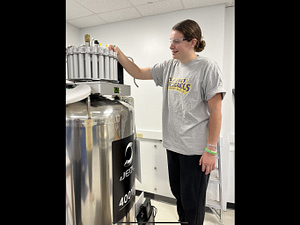
JEOL ECZ 400YH NMR Spectrometer
Next generation 2‐channel NMR spectrometer ECZL S series is a model dedicated to 400 MHz solutions‐state NMR while incorporating the high performance digital high frequency technology of the ECZL series.
Nuclear Magnetic Resonance (NMR) spectroscopy is an analytical chemistry technique used in quality control and research for determining the content and purity of a sample as well as its molecular structure. For example, NMR can quantitatively analyze mixtures containing known organic compounds.
Liquid Chromatography‐Mass Spectrometer
Shimadzu LCMS‐8045 High‐Performance Liquid Chromatograph Mass Spectrometer
The triple quadrupole LCMS‐8045 is the workhorse instrument in the Shimadzu LC‐MS/MS lineup. The heated ESI probe, high‐temperature heating block, heated desolvation line, drying gas, and focusing optics all act to maximize sensitivity while minimizing contamination. This means continuous operation in the laboratory with reliable data collection, even for complex matrices like biological fluids or foods.
Gas Chromatography‐Mass Spectrometer
Shimadzu GCMS‐QP2010 SE
The GCMS‐QP2010 SE is a single quadrupole gas chromatograph‐mass spectrometer offering stable and cost‐effective analysis for challenging compounds. A high‐performance quadrupole mass filter ensures high sensitivity in both quantitative and qualitative analysis.
Inductively Coupled Plasma‐Optical Emission Spectrophotometer
Agilent 5110 ICP‐OES
ICP‐OES is a technique in which the composition of elements in (mostly water‐dissolved) samples can be determined using plasma and a spectrometer. The Agilent 5110 allows for highest analytical precision and fast analysis with the unique dichroic spectral combiner (DSC) that enables synchronous radial and axial measurements. Reduced running costs and increased productivity are achieved by minimizing sample uptake, stabilization times, and rinse delays.
UV‐Vis Spectrophotometer
PerkinElmer LAMBDA 35
Our UV/Vis spectrophotometer is a high performance UV/Vis system designed for research. The instrument meets industry standards for ultra‐high performance, flexibility, and convenience.
Nicolet iS5 FTIR Spectrometer
The Thermo Scientific Nicolet FTIR spectrometer can help you reach new heights in productivity, allowing you to accomplish more in less time. Simple yet high-functionality software allows new and experienced uses alike to use the instrument with ease. The Nicolet Spectrometer is designed for reliability and accuracy.
Our FTIR is equipped with the Nicolet iD5 attenuated Total Reflectance (ATR) attachment that enables the direct examination of solid or liquid samples without further preparation.
Spectrofluorimeter
Olis DM 45 Scanning Spectrofluorimeter
The Olis DM 45 scanning spectrofluorimeter is a research quality scanning spectrofluorimeter. Standard detection is achieved with a highest sensitivity photon counting module, with a useful spectral range of 250‐850 nm.
The two Olis single grating monochromators have accessible gratings for easy optimization of the hardware for different spectral ranges, from the far UV (>180 nm) to the NIR (<2600 nm). The model is optimized for UV/Vis. Emission, excitation, and synchronous scanning are supported.
Automated Surface Area and Porosity Analyzer
Micromeritics ASAP 2020
The ASAP 2020 Plus is a high‐performance adsorption analyzer for measuring surface area, pore size, and pore volume of powders and porous materials. Standard Methods can be used to characterize adsorbents, catalysts, zeolites, MOFs, APIs, excipients, and a wide variety of porous and non‐porous materials. The ASAP 2020 Plus is ideally suited for gas adsorption analysis of microporous (0.35 to 2nm) and mesoporous (2 to 50nm) materials and delivers superior accuracy, resolution and data reduction.
Additional Equipment
The Chemistry Department is equipped with other instruments and equipment useful for analysis or sample preparation.
pH Meters
Analytical Balances Automated Chromatography UV‐Vis Plate Reader Muffle Furnace
Tube Furnace
Ovens
Sonicators
Roto evaporators Polarimeters
Microwave Reactor Centrifuges
Schlenk Lines
In Depth
Our program focuses on preparing you to succeed in industry and academia by helping you develop the skills to solve chemical problems, to read meaningfully and to utilize properly chemical literature, to work effectively and safely in the laboratory, to communicate scientific ideas and discoveries both orally and in writing, to function well as a member of a team, and to make ethical decisions in the area of science.
Chemistry is the study of matter and its changes. As a chemistry major, you will start with the science and math courses that provide the background necessary to study chemistry. Those courses include General Chemistry I &II, Organic Chemistry I &II, Calculus I &II, College Physics I &II, and Integrated Chemical Analysis. In these introductory chemistry courses, you will gain a broad overview of the many different topics in chemistry, including stoichiometry, bonding, gases, the structure of atoms and molecules, acid-base theory, organic synthesis, error analysis, ethical issues in science, and quantitative analysis. Then you will go on to study further in the areas of inorganic chemistry, physical chemistry, biochemistry and chemical instrumentation, where you will learn about thermodynamics, kinetics, quantum chemistry and spectroscopy, the structure and formation of coordination compounds, group theory, some of the major categories of structures that make up biological systems (including peptides/proteins, carbohydrates and nucleic acids), and the chemical instrumentation that can be used to study the structure and function of molecules.
As a senior, you will research a chemistry topic in great depth as part of your capstone course, Senior Seminar. You will have two options: you may either prepare a major report on the topic or develop a related research proposal (modeled after the process whereby scientists procure funding for research). For examples of recent chemistry senior projects, go to Seminar Projects. You will also be strongly encouraged to conduct academic research or complete an internship as part of your education.
Careers
Saint Michael’s alumni are involved in careers powered by purpose.
Graduates from our chemistry program have forged remarkable paths in diverse fields, exemplifying the versatility and depth of their experience in the Saint Michael’s College Chemistry program.
Katherine (Katie) Schutt, BS & PhD
Scientist in Engineered Cells, Synthego
SMC major: Chemistry
SMC minors: Biology & Mathematics
College highlights: lab preparatory worker & teaching assistant for Chemistry; conducted research with Chemistry Professor Shane Lamos; a Goldwater Scholar* (the premier under-graduate award in math, science & engineering); recognized as the outstanding senior in Chemistry, awarded at graduation; co-valedictorian for her graduating class
PhD: Dartmouth College, in Cell Biology and Biochemistry
Current position: Katie is working as a Scientist in Engineered Cells at Synthego in the Bay Area of California. They generate custom CRISPR-engineered cell lines for research purposes.
Jasmine Magloire, BS & EMT
Emergency Medical Technician
SMC major: Chemistry
SMC minor: Gender Studies
College highlights: lab preparatory worker & lab teaching assistant in Chemistry; did an independent study project with Chemistry Professor Schroll, involved development of a new lab project for organic chemistry; obtained EMT certification through Essex VT Fire & Rescue
Current position: Jasmine is working as a full-time EMT with the 911 service in her hometown. Her long-term goal is to train to be a flight paramedic or flight nurse.
Katie (Summo) Kavouris, BS & PhD
Associate Director of Process Chemistry at Syros Pharmaceuticals
SMC major: Chemistry
SMC minor: Mathematics
College highlights: lab preparatory worker in Chemistry; conducted 2 summers of research with Chemistry Professor Shane Lamos
PhD: Boston University Department of Chemistry
Current position: Katie is an Associate Director of Process Chemistry at Syros Pharmaceuticals, Cambridge MA. She
leads all chemistry activities for the development of active compounds in potential drugs, from finding and optimizing
the best synthetic route through to multi kilogram-scale manufacturing.
Emily Schuchman, BS & DVM
Veterinarian
SMC major: Biochemistry
College highlights: During semesters and summers, Emily did a great deal of volunteering, shadowing, and working at veterinary clinics. While completing her senior year at SMC, she worked full-time for a local vet clinic.
Advanced education: Saint George’s University School of Veterinary Medicine
Current position: Emily is an associate veterinarian at a private general practice as well as a part-time associate for a mobile
euthanasia service, Lap of Love. Her days are incredibly busy, ranging from healthy puppy/kitten visits, sick pet appointments, a wide variety of surgeries, and euthanasia.
David Weiss, BS & RN
RN III and Charge Nurse
SMC major: Biochemistry
SMC minor: Medieval Studies
College highlights: lab preparatory worker & teaching assistant in Chemistry; also volunteered for SMC Fire & Rescue*; conducted research with Chemistry Professor Christina Chant
Advanced degree: completed a Bachelor of Science in Nursing program at ECPI University in Florida
Current position: David is a RN III and charge nurse at the University of Vermont Medical Center’s Emergency Department. He is also a disaster medicine specialist with the Vermont State Urban Search and Rescue task force.
Graduate Study
See the exciting work our alumni our doing in graduate programs.
Our chemistry program has an excellent track record for acceptance to graduate and professional schools. Forty-two percent of our chemistry and biochemistry graduates immediately attend graduate science or medical schools.
Austin Flueckiger, BS, PhD candidate
SMC major: Chemistry
SMC minors: Biology & Environmental Studies
College highlights: lab preparatory worker, teaching assistant & tutor for chemistry; conducted research with Chemistry Professor Christina Chant
Current position: Austin is a 4th year graduate student completing his PhD in Chemistry at the University of Vermont. His research is focused on the impact of relative humidity on the physical and chemical properties of organic aerosols. By monitoring their properties, it is possible to see how water plays a role in their formation which can help us understand how aerosols impact our environment.
Mohamed Fofana, BS, medical student
SMC major: Biochemistry
SMC minor: Psychology
College highlights: lab preparatory worker & lab teaching assistant in Chemistry; conducted research with Biology Professor Declan McCabe.
Advanced education: Mohamed completed a post-baccalaureate program at Rutgers University, to better prepare him to apply to medical school.
Current position: Mohamed is a medical student at the University of Wisconsin. He will likely specialize in Emergency Medicine.
Noah Robinson, BS, PhD candidate
SMC majors: Biochemistry & Philosophy
College highlights: lab preparatory worker & tutor in Chemistry; conducted research with Biology Professor Mark Lubkowitz; recognized as outstanding senior in both Biochemistry & Philosophy, awarded at graduation
Current position: Noah is a Bioengineering PhD student at Caltech in Pasadena CA. He is working on a project to develop a new cloning technique which may eventually make it possible to construct entire synthetic organisms whose genomes have been assembled from scratch.
Coline Redeker, BS, medical student
SMC major: Biochemistry
SMC minor: Psychology
College highlights: volunteered for the SMC Fire & Rescue all four years; lab preparatory worker for Chemistry
Current position: Coline is a medical student at the University of Connecticut School of Medicine. She intends to specialize in pediatric emergency medicine.
Rusul Mustafa, BS, PhD candidate
SMC major: Chemistry
College highlights: lab teaching assistant for Chemistry; conducted research with Chemistry Professor Christina Chant
Current position: Rusul is currently a PhD student in the chemistry program at the University of Vermont, specializing in analytical chemistry. She is working on developing Raman spectroscopy techniques to understand the cellular mechanisms and the molecular interactions of polymeric nanoparticles used for gene therapy research.
Other Graduate schools that our alumni have attended recently include:
Boston University
Dartmouth College
Duke University
Tufts University
University College of Dublin
University of Connecticut
University of Maryland
University of Massachusetts
University of Pennsylvania
University of Rochester
University of Vermont
University of Washington State
University of Wisconsin
West Virginia University
Yale University
Research
Training Beyond the Traditional Classroom
Chemistry research plays a pivotal role in education by offering students a platform to deepen their understanding of fundamental principles and develop critical thinking skills. At Saint Michael’s College student sponsored research focuses on hands-on experimentation and analysis, experimental design, interpretation of data, and communicate findings effectively. This process not only enhances their grasp of scientific concepts but also cultivates problem-solving abilities crucial for success in academia and beyond. Furthermore, engaging in chemistry research prepares students for future careers by providing practical experience and making them more competitive in the job market. See our career’s tab for examples of where our alumni land.
Student Presentations at National Meetings
Most research active students present their work at the National American Chemical Society (ACS) meetings which are held twice a year all over the country. Below are just a few recent examples of student presentations and their corresponding abstracts.
Declan Hutchinson (Biochemistry Major)
Faculty Sponsor: Dr. Andrew Korich
Topic: Boron-containing substrates and reagents possess a unique ability to transition between tricoordinate and tetracoordinate states, making them valuable in medicinal therapeutics and organic syntheses. The evaluation of boron-based systems using the Gutmann-Beckett Acceptor Number approach aims to enhance understanding of boron Lewis acidity and the reactivity of mixed boron trihalides, which remains incompletely assessed.
Amanda Spink, Haley Poitras
Faculty Sponsor: Dr. David Heroux
Topic: Various mesoporous zirconia catalysts were created using a sol‐gel method with different surface areas. Two modification approaches were explored: sulfation and titanium addition. The modified catalysts were analyzed using FTIR‐ATR spectroscopy and N2 physisorption to assess surface properties. Catalytic performance was evaluated through self‐aldol condensation of cyclopentanone, followed by GCMS analysis.
Funding and Support
Each year many of our majors undertake original research projects in our laboratories with SMC Chemistry & Biochemistry faculty serving as mentors. Credit earning, paid, and volunteer opportunities are available. Student salaries are supported by a number of SMC initiatives. Additionally, many SMC students have been awarded Internships and Research Experiences at institutions across the United States and world.
Recent Funding Agencies Include:
Instrumentation

JEOL ECZ 400YH NMR Spectrometer
Next generation 2‐channel NMR spectrometer ECZL S series is a model dedicated to 400 MHz solutions‐state NMR while incorporating the high performance digital high frequency technology of the ECZL series.
Nuclear Magnetic Resonance (NMR) spectroscopy is an analytical chemistry technique used in quality control and research for determining the content and purity of a sample as well as its molecular structure. For example, NMR can quantitatively analyze mixtures containing known organic compounds.
Liquid Chromatography‐Mass Spectrometer
Shimadzu LCMS‐8045 High‐Performance Liquid Chromatograph Mass Spectrometer
The triple quadrupole LCMS‐8045 is the workhorse instrument in the Shimadzu LC‐MS/MS lineup. The heated ESI probe, high‐temperature heating block, heated desolvation line, drying gas, and focusing optics all act to maximize sensitivity while minimizing contamination. This means continuous operation in the laboratory with reliable data collection, even for complex matrices like biological fluids or foods.
Gas Chromatography‐Mass Spectrometer
Shimadzu GCMS‐QP2010 SE
The GCMS‐QP2010 SE is a single quadrupole gas chromatograph‐mass spectrometer offering stable and cost‐effective analysis for challenging compounds. A high‐performance quadrupole mass filter ensures high sensitivity in both quantitative and qualitative analysis.
Inductively Coupled Plasma‐Optical Emission Spectrophotometer
Agilent 5110 ICP‐OES
ICP‐OES is a technique in which the composition of elements in (mostly water‐dissolved) samples can be determined using plasma and a spectrometer. The Agilent 5110 allows for highest analytical precision and fast analysis with the unique dichroic spectral combiner (DSC) that enables synchronous radial and axial measurements. Reduced running costs and increased productivity are achieved by minimizing sample uptake, stabilization times, and rinse delays.
UV‐Vis Spectrophotometer
PerkinElmer LAMBDA 35
Our UV/Vis spectrophotometer is a high performance UV/Vis system designed for research. The instrument meets industry standards for ultra‐high performance, flexibility, and convenience.
Nicolet iS5 FTIR Spectrometer
The Thermo Scientific Nicolet FTIR spectrometer can help you reach new heights in productivity, allowing you to accomplish more in less time. Simple yet high-functionality software allows new and experienced uses alike to use the instrument with ease. The Nicolet Spectrometer is designed for reliability and accuracy.
Our FTIR is equipped with the Nicolet iD5 attenuated Total Reflectance (ATR) attachment that enables the direct examination of solid or liquid samples without further preparation.
Spectrofluorimeter
Olis DM 45 Scanning Spectrofluorimeter
The Olis DM 45 scanning spectrofluorimeter is a research quality scanning spectrofluorimeter. Standard detection is achieved with a highest sensitivity photon counting module, with a useful spectral range of 250‐850 nm.
The two Olis single grating monochromators have accessible gratings for easy optimization of the hardware for different spectral ranges, from the far UV (>180 nm) to the NIR (<2600 nm). The model is optimized for UV/Vis. Emission, excitation, and synchronous scanning are supported.
Automated Surface Area and Porosity Analyzer
Micromeritics ASAP 2020
The ASAP 2020 Plus is a high‐performance adsorption analyzer for measuring surface area, pore size, and pore volume of powders and porous materials. Standard Methods can be used to characterize adsorbents, catalysts, zeolites, MOFs, APIs, excipients, and a wide variety of porous and non‐porous materials. The ASAP 2020 Plus is ideally suited for gas adsorption analysis of microporous (0.35 to 2nm) and mesoporous (2 to 50nm) materials and delivers superior accuracy, resolution and data reduction.
Additional Equipment
The Chemistry Department is equipped with other instruments and equipment useful for analysis or sample preparation.
pH Meters
Analytical Balances Automated Chromatography UV‐Vis Plate Reader Muffle Furnace
Tube Furnace
Ovens
Sonicators
Roto evaporators Polarimeters
Microwave Reactor Centrifuges
Schlenk Lines
